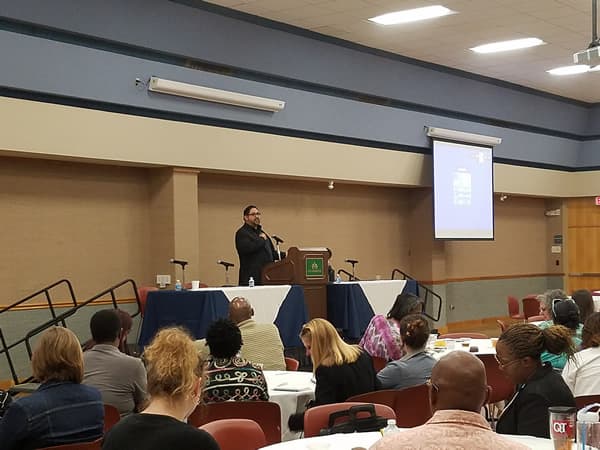
UNC Charlotte’s efforts to drive the conversation on providing care to underserved populations took a step forward with an inaugural summit to address the mental health needs of Latinos.
The 2017 Latinx Mental Health Summit drew more than 200 clinical experts, scholars and helping professionals from around the United States. The free, one-day event featured nationally respected scholars Patricia Arredondo and Luis Cruz-Ortega, who shared their expertise and research. Arredondo is a psychologist with extensive experience working with the Latino population and addressing the importance of cultural competence in clinical care. Cruz-Ortega is a senior staff psychologist at the Ohio State University Counseling and Consultation Service. The summit also included two separate panel discussions.
“This summit was unique in that it focused primarily on mental health issues and their influence on general health and because it emphasized community action,” said Daniel Gutierrez, a UNC Charlotte counseling professor and the event's organizer. Gutierrez's previous work with the Latino community in Charlotte has garnered national attention.
The need for mental health services among Latinos is a growing concern. One in 11 Latinos with a mental health disorder contact a mental health specialist, and recent immigrants rarely have access to any such services. It is estimated that by 2060 Latinos will be the largest ethnic minority in the United States, comprising 31 percent of the nation’s population. Innovative, culturally appropriate solutions will help increase treatment options and approaches for Latinos with mental health disorders.
"This kind of community engagement takes time and trust to develop and is a lot less common in academia than I would like," said Laura Gonzalez, a counseling professor at UNC Greensboro. "The fact that so many of us drove in from counties outside of [the area] shows how much interest there is in increasing our capacity to work effectively with Latinos/as, and I do see UNC Charlotte as ahead of the curve."
Gutierrez was encouraged by the enthusiasm surrounding the summit, which sold out several weeks in advance. He said Charlotte is primed to be a leader in addressing Latino mental health.
“This city is an immigrant gateway with one of the largest populations of Latinos. The challenges facing the Latino community affect all of us living here. They are issues of justice and equity, but they are also issues of community health and well-being. The summit was about gathering together to confront these challenges and mobilizing strategies for change with one voice.”
The event connects to larger efforts by the Academy for Research on Community Health, Engagement and Services (ARCHES), a diverse group of UNC Charlotte researchers dedicated to improving health in vulnerable communities and to advancing the scientific and social missions of the health and health-related sciences. Learn more about ARCHES here.